B628 Organizations and People: Factors for Successful Teams TMA
VerifiedAdded on 2023/05/29
|11
|3443
|222
Report
AI Summary
This report analyzes the key attributes and factors that contribute to the success and failure of teams within an organizational context. It begins by defining teamwork as a collaborative effort and emphasizes the importance of a shared goal, communication, and interdependence among team members. The report then explores the role of managers in fostering successful teams, including monitoring and controlling various aspects. It examines the impact of team composition, such as homogenous versus heterogeneous groups, and the stages of team development, including forming, storming, norming, performing, and adjourning. The report highlights the significance of conflict resolution and effective communication within teams. Furthermore, the report identifies the main factors for unsuccessful teams, such as ineffective commitment, lack of interdependence, poor interpersonal skills, conflict behavior, ineffective communication, and inappropriate team composition. The report is based on a case study and course material to provide a comprehensive understanding of team dynamics and management strategies.
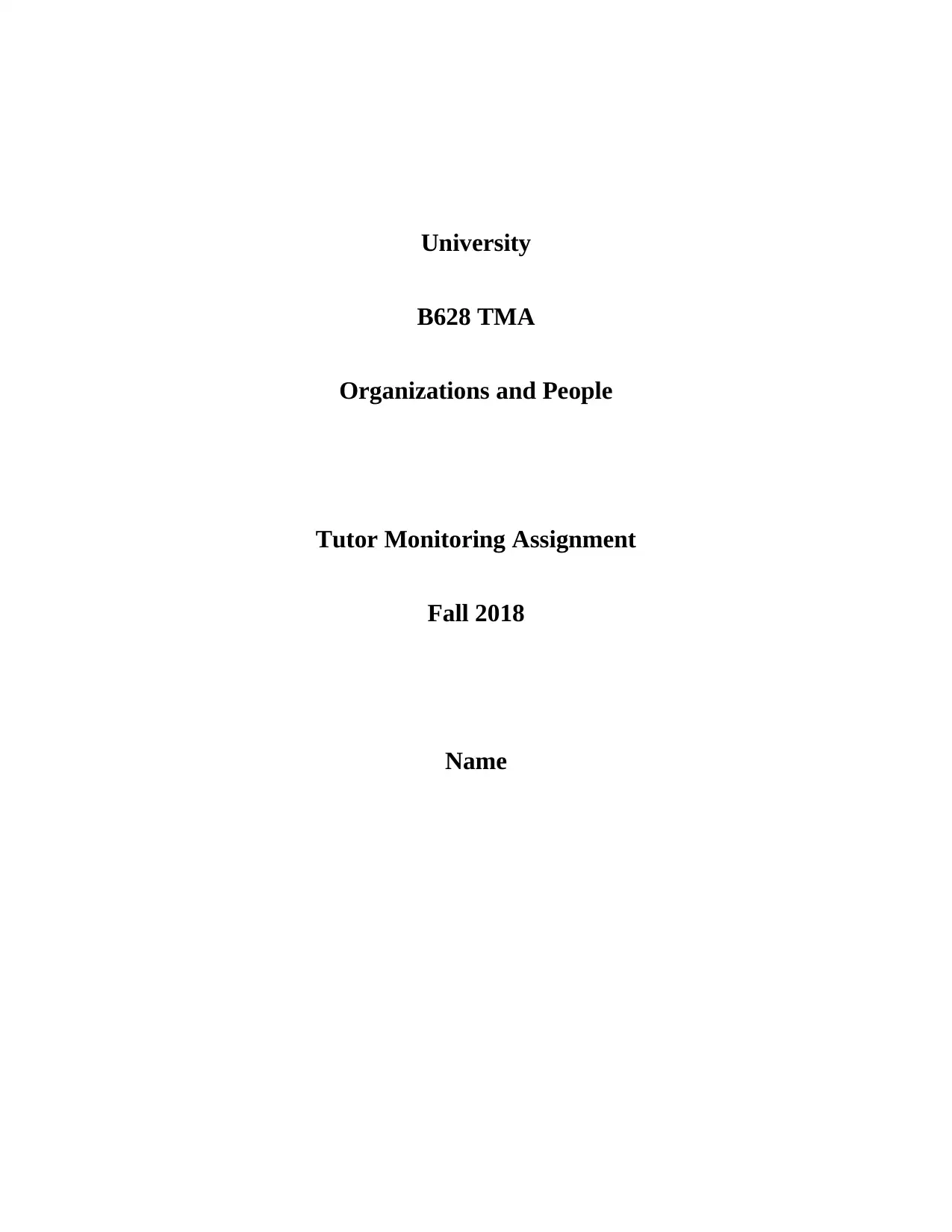
University
B628 TMA
Organizations and People
Tutor Monitoring Assignment
Fall 2018
Name
B628 TMA
Organizations and People
Tutor Monitoring Assignment
Fall 2018
Name
Paraphrase This Document
Need a fresh take? Get an instant paraphrase of this document with our AI Paraphraser
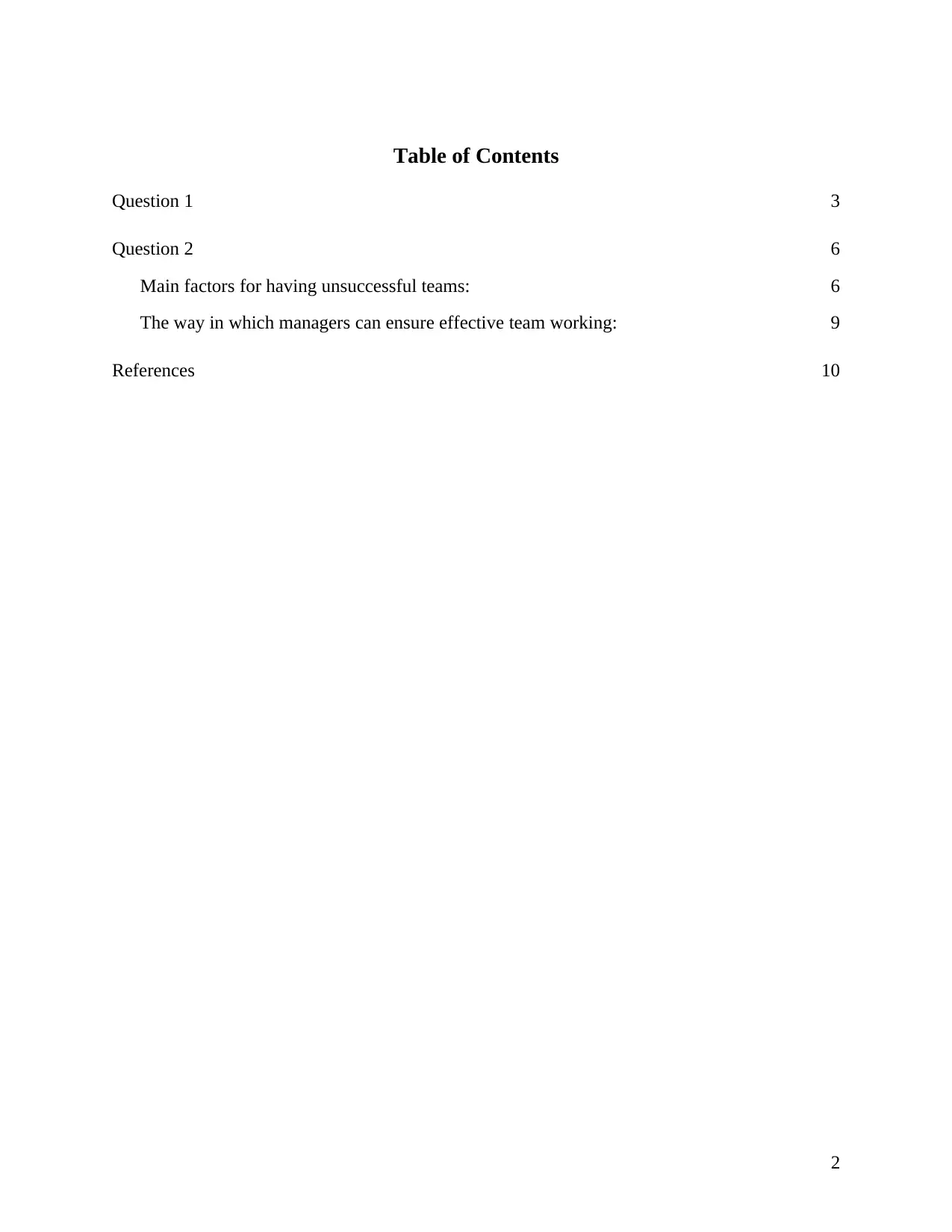
Table of Contents
Question 1 3
Question 2 6
Main factors for having unsuccessful teams: 6
The way in which managers can ensure effective team working: 9
References 10
2
Question 1 3
Question 2 6
Main factors for having unsuccessful teams: 6
The way in which managers can ensure effective team working: 9
References 10
2
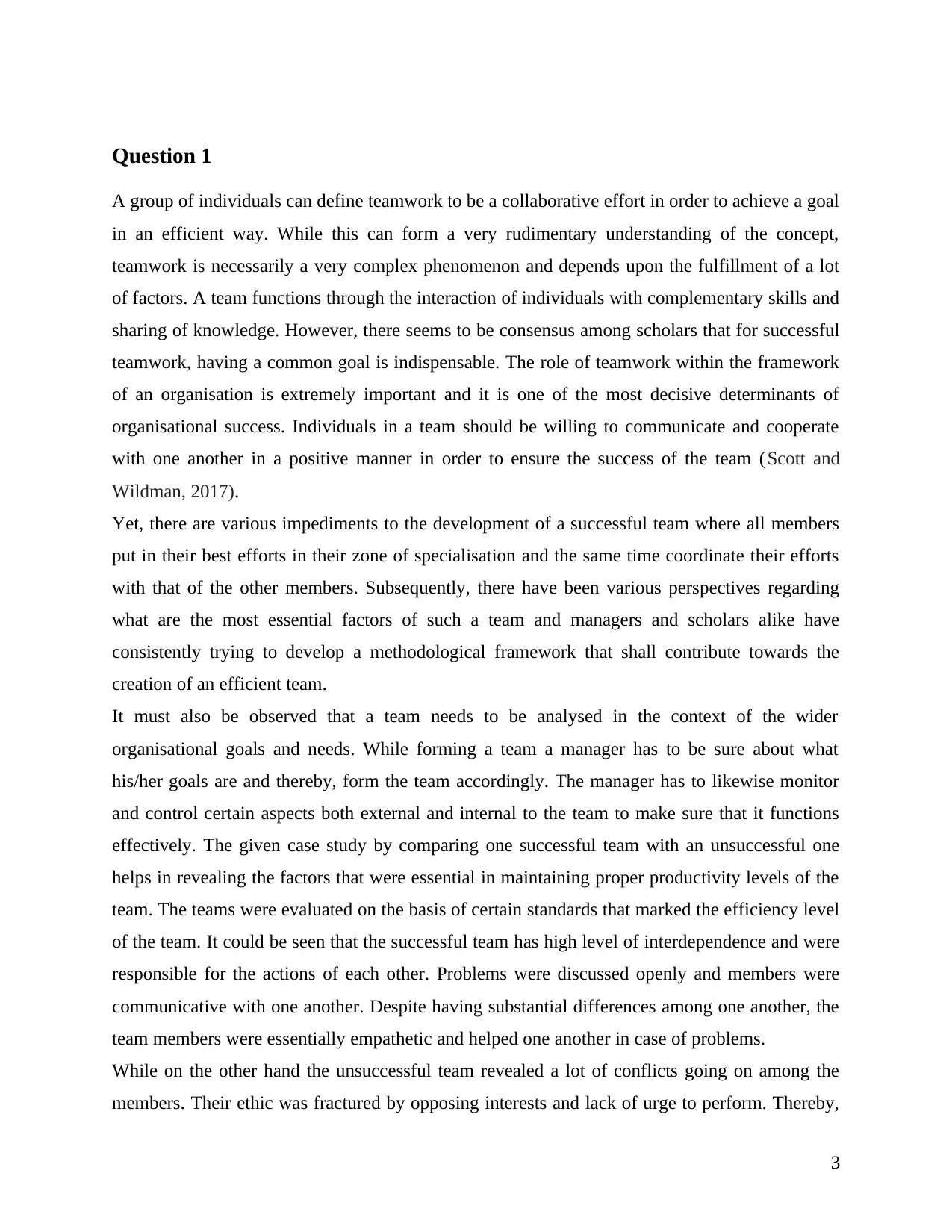
Question 1
A group of individuals can define teamwork to be a collaborative effort in order to achieve a goal
in an efficient way. While this can form a very rudimentary understanding of the concept,
teamwork is necessarily a very complex phenomenon and depends upon the fulfillment of a lot
of factors. A team functions through the interaction of individuals with complementary skills and
sharing of knowledge. However, there seems to be consensus among scholars that for successful
teamwork, having a common goal is indispensable. The role of teamwork within the framework
of an organisation is extremely important and it is one of the most decisive determinants of
organisational success. Individuals in a team should be willing to communicate and cooperate
with one another in a positive manner in order to ensure the success of the team (Scott and
Wildman, 2017).
Yet, there are various impediments to the development of a successful team where all members
put in their best efforts in their zone of specialisation and the same time coordinate their efforts
with that of the other members. Subsequently, there have been various perspectives regarding
what are the most essential factors of such a team and managers and scholars alike have
consistently trying to develop a methodological framework that shall contribute towards the
creation of an efficient team.
It must also be observed that a team needs to be analysed in the context of the wider
organisational goals and needs. While forming a team a manager has to be sure about what
his/her goals are and thereby, form the team accordingly. The manager has to likewise monitor
and control certain aspects both external and internal to the team to make sure that it functions
effectively. The given case study by comparing one successful team with an unsuccessful one
helps in revealing the factors that were essential in maintaining proper productivity levels of the
team. The teams were evaluated on the basis of certain standards that marked the efficiency level
of the team. It could be seen that the successful team has high level of interdependence and were
responsible for the actions of each other. Problems were discussed openly and members were
communicative with one another. Despite having substantial differences among one another, the
team members were essentially empathetic and helped one another in case of problems.
While on the other hand the unsuccessful team revealed a lot of conflicts going on among the
members. Their ethic was fractured by opposing interests and lack of urge to perform. Thereby,
3
A group of individuals can define teamwork to be a collaborative effort in order to achieve a goal
in an efficient way. While this can form a very rudimentary understanding of the concept,
teamwork is necessarily a very complex phenomenon and depends upon the fulfillment of a lot
of factors. A team functions through the interaction of individuals with complementary skills and
sharing of knowledge. However, there seems to be consensus among scholars that for successful
teamwork, having a common goal is indispensable. The role of teamwork within the framework
of an organisation is extremely important and it is one of the most decisive determinants of
organisational success. Individuals in a team should be willing to communicate and cooperate
with one another in a positive manner in order to ensure the success of the team (Scott and
Wildman, 2017).
Yet, there are various impediments to the development of a successful team where all members
put in their best efforts in their zone of specialisation and the same time coordinate their efforts
with that of the other members. Subsequently, there have been various perspectives regarding
what are the most essential factors of such a team and managers and scholars alike have
consistently trying to develop a methodological framework that shall contribute towards the
creation of an efficient team.
It must also be observed that a team needs to be analysed in the context of the wider
organisational goals and needs. While forming a team a manager has to be sure about what
his/her goals are and thereby, form the team accordingly. The manager has to likewise monitor
and control certain aspects both external and internal to the team to make sure that it functions
effectively. The given case study by comparing one successful team with an unsuccessful one
helps in revealing the factors that were essential in maintaining proper productivity levels of the
team. The teams were evaluated on the basis of certain standards that marked the efficiency level
of the team. It could be seen that the successful team has high level of interdependence and were
responsible for the actions of each other. Problems were discussed openly and members were
communicative with one another. Despite having substantial differences among one another, the
team members were essentially empathetic and helped one another in case of problems.
While on the other hand the unsuccessful team revealed a lot of conflicts going on among the
members. Their ethic was fractured by opposing interests and lack of urge to perform. Thereby,
3
⊘ This is a preview!⊘
Do you want full access?
Subscribe today to unlock all pages.

Trusted by 1+ million students worldwide
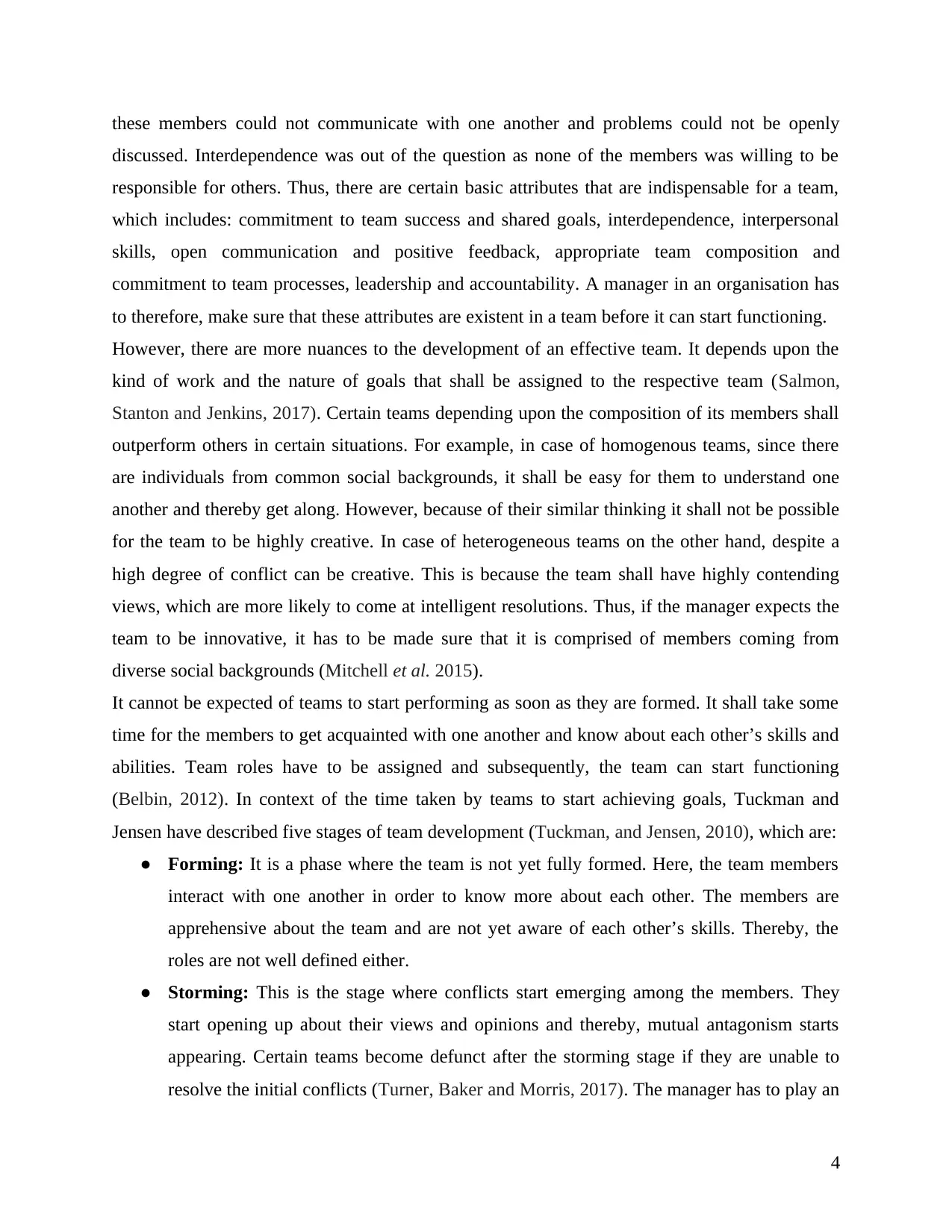
these members could not communicate with one another and problems could not be openly
discussed. Interdependence was out of the question as none of the members was willing to be
responsible for others. Thus, there are certain basic attributes that are indispensable for a team,
which includes: commitment to team success and shared goals, interdependence, interpersonal
skills, open communication and positive feedback, appropriate team composition and
commitment to team processes, leadership and accountability. A manager in an organisation has
to therefore, make sure that these attributes are existent in a team before it can start functioning.
However, there are more nuances to the development of an effective team. It depends upon the
kind of work and the nature of goals that shall be assigned to the respective team (Salmon,
Stanton and Jenkins, 2017). Certain teams depending upon the composition of its members shall
outperform others in certain situations. For example, in case of homogenous teams, since there
are individuals from common social backgrounds, it shall be easy for them to understand one
another and thereby get along. However, because of their similar thinking it shall not be possible
for the team to be highly creative. In case of heterogeneous teams on the other hand, despite a
high degree of conflict can be creative. This is because the team shall have highly contending
views, which are more likely to come at intelligent resolutions. Thus, if the manager expects the
team to be innovative, it has to be made sure that it is comprised of members coming from
diverse social backgrounds (Mitchell et al. 2015).
It cannot be expected of teams to start performing as soon as they are formed. It shall take some
time for the members to get acquainted with one another and know about each other’s skills and
abilities. Team roles have to be assigned and subsequently, the team can start functioning
(Belbin, 2012). In context of the time taken by teams to start achieving goals, Tuckman and
Jensen have described five stages of team development (Tuckman, and Jensen, 2010), which are:
● Forming: It is a phase where the team is not yet fully formed. Here, the team members
interact with one another in order to know more about each other. The members are
apprehensive about the team and are not yet aware of each other’s skills. Thereby, the
roles are not well defined either.
● Storming: This is the stage where conflicts start emerging among the members. They
start opening up about their views and opinions and thereby, mutual antagonism starts
appearing. Certain teams become defunct after the storming stage if they are unable to
resolve the initial conflicts (Turner, Baker and Morris, 2017). The manager has to play an
4
discussed. Interdependence was out of the question as none of the members was willing to be
responsible for others. Thus, there are certain basic attributes that are indispensable for a team,
which includes: commitment to team success and shared goals, interdependence, interpersonal
skills, open communication and positive feedback, appropriate team composition and
commitment to team processes, leadership and accountability. A manager in an organisation has
to therefore, make sure that these attributes are existent in a team before it can start functioning.
However, there are more nuances to the development of an effective team. It depends upon the
kind of work and the nature of goals that shall be assigned to the respective team (Salmon,
Stanton and Jenkins, 2017). Certain teams depending upon the composition of its members shall
outperform others in certain situations. For example, in case of homogenous teams, since there
are individuals from common social backgrounds, it shall be easy for them to understand one
another and thereby get along. However, because of their similar thinking it shall not be possible
for the team to be highly creative. In case of heterogeneous teams on the other hand, despite a
high degree of conflict can be creative. This is because the team shall have highly contending
views, which are more likely to come at intelligent resolutions. Thus, if the manager expects the
team to be innovative, it has to be made sure that it is comprised of members coming from
diverse social backgrounds (Mitchell et al. 2015).
It cannot be expected of teams to start performing as soon as they are formed. It shall take some
time for the members to get acquainted with one another and know about each other’s skills and
abilities. Team roles have to be assigned and subsequently, the team can start functioning
(Belbin, 2012). In context of the time taken by teams to start achieving goals, Tuckman and
Jensen have described five stages of team development (Tuckman, and Jensen, 2010), which are:
● Forming: It is a phase where the team is not yet fully formed. Here, the team members
interact with one another in order to know more about each other. The members are
apprehensive about the team and are not yet aware of each other’s skills. Thereby, the
roles are not well defined either.
● Storming: This is the stage where conflicts start emerging among the members. They
start opening up about their views and opinions and thereby, mutual antagonism starts
appearing. Certain teams become defunct after the storming stage if they are unable to
resolve the initial conflicts (Turner, Baker and Morris, 2017). The manager has to play an
4
Paraphrase This Document
Need a fresh take? Get an instant paraphrase of this document with our AI Paraphraser
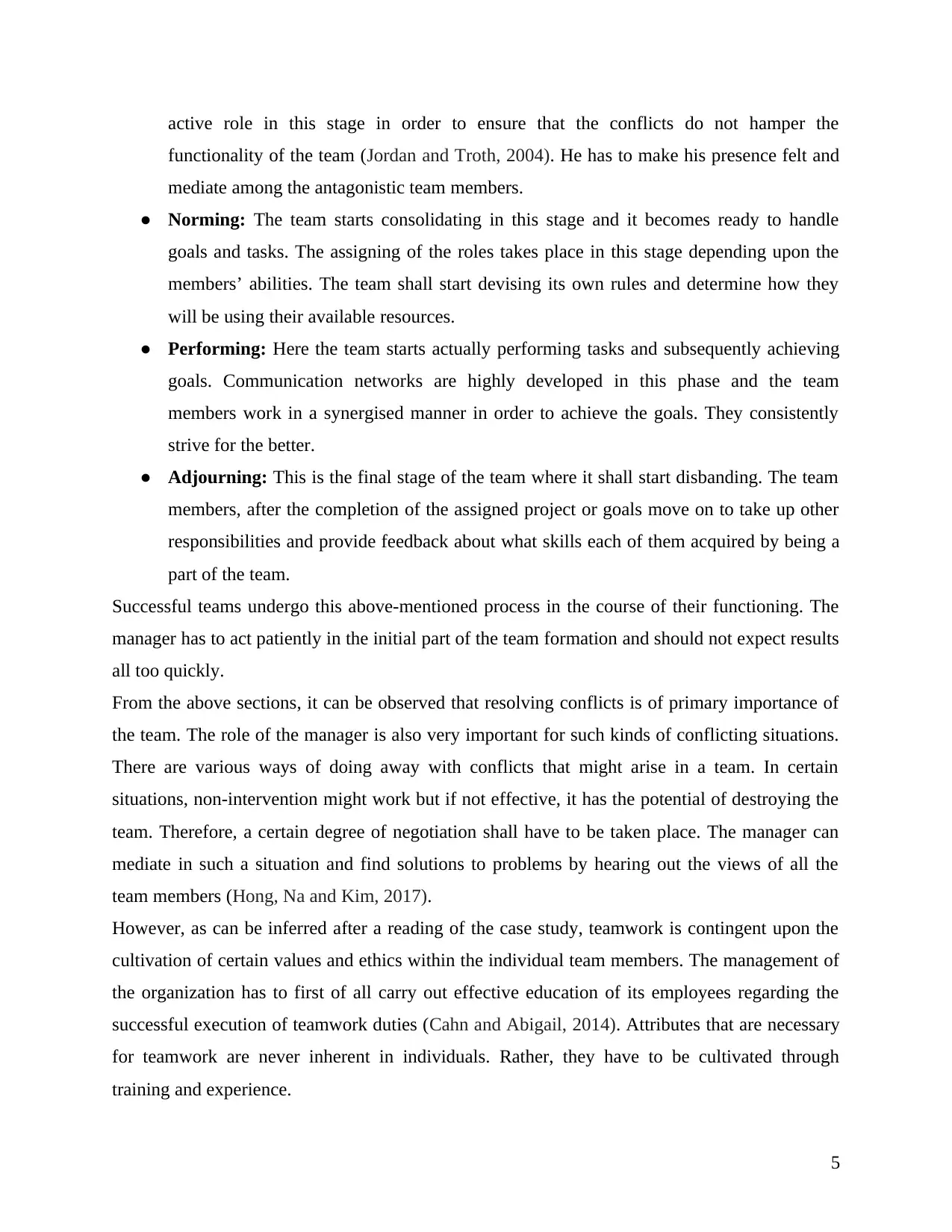
active role in this stage in order to ensure that the conflicts do not hamper the
functionality of the team (Jordan and Troth, 2004). He has to make his presence felt and
mediate among the antagonistic team members.
● Norming: The team starts consolidating in this stage and it becomes ready to handle
goals and tasks. The assigning of the roles takes place in this stage depending upon the
members’ abilities. The team shall start devising its own rules and determine how they
will be using their available resources.
● Performing: Here the team starts actually performing tasks and subsequently achieving
goals. Communication networks are highly developed in this phase and the team
members work in a synergised manner in order to achieve the goals. They consistently
strive for the better.
● Adjourning: This is the final stage of the team where it shall start disbanding. The team
members, after the completion of the assigned project or goals move on to take up other
responsibilities and provide feedback about what skills each of them acquired by being a
part of the team.
Successful teams undergo this above-mentioned process in the course of their functioning. The
manager has to act patiently in the initial part of the team formation and should not expect results
all too quickly.
From the above sections, it can be observed that resolving conflicts is of primary importance of
the team. The role of the manager is also very important for such kinds of conflicting situations.
There are various ways of doing away with conflicts that might arise in a team. In certain
situations, non-intervention might work but if not effective, it has the potential of destroying the
team. Therefore, a certain degree of negotiation shall have to be taken place. The manager can
mediate in such a situation and find solutions to problems by hearing out the views of all the
team members (Hong, Na and Kim, 2017).
However, as can be inferred after a reading of the case study, teamwork is contingent upon the
cultivation of certain values and ethics within the individual team members. The management of
the organization has to first of all carry out effective education of its employees regarding the
successful execution of teamwork duties (Cahn and Abigail, 2014). Attributes that are necessary
for teamwork are never inherent in individuals. Rather, they have to be cultivated through
training and experience.
5
functionality of the team (Jordan and Troth, 2004). He has to make his presence felt and
mediate among the antagonistic team members.
● Norming: The team starts consolidating in this stage and it becomes ready to handle
goals and tasks. The assigning of the roles takes place in this stage depending upon the
members’ abilities. The team shall start devising its own rules and determine how they
will be using their available resources.
● Performing: Here the team starts actually performing tasks and subsequently achieving
goals. Communication networks are highly developed in this phase and the team
members work in a synergised manner in order to achieve the goals. They consistently
strive for the better.
● Adjourning: This is the final stage of the team where it shall start disbanding. The team
members, after the completion of the assigned project or goals move on to take up other
responsibilities and provide feedback about what skills each of them acquired by being a
part of the team.
Successful teams undergo this above-mentioned process in the course of their functioning. The
manager has to act patiently in the initial part of the team formation and should not expect results
all too quickly.
From the above sections, it can be observed that resolving conflicts is of primary importance of
the team. The role of the manager is also very important for such kinds of conflicting situations.
There are various ways of doing away with conflicts that might arise in a team. In certain
situations, non-intervention might work but if not effective, it has the potential of destroying the
team. Therefore, a certain degree of negotiation shall have to be taken place. The manager can
mediate in such a situation and find solutions to problems by hearing out the views of all the
team members (Hong, Na and Kim, 2017).
However, as can be inferred after a reading of the case study, teamwork is contingent upon the
cultivation of certain values and ethics within the individual team members. The management of
the organization has to first of all carry out effective education of its employees regarding the
successful execution of teamwork duties (Cahn and Abigail, 2014). Attributes that are necessary
for teamwork are never inherent in individuals. Rather, they have to be cultivated through
training and experience.
5
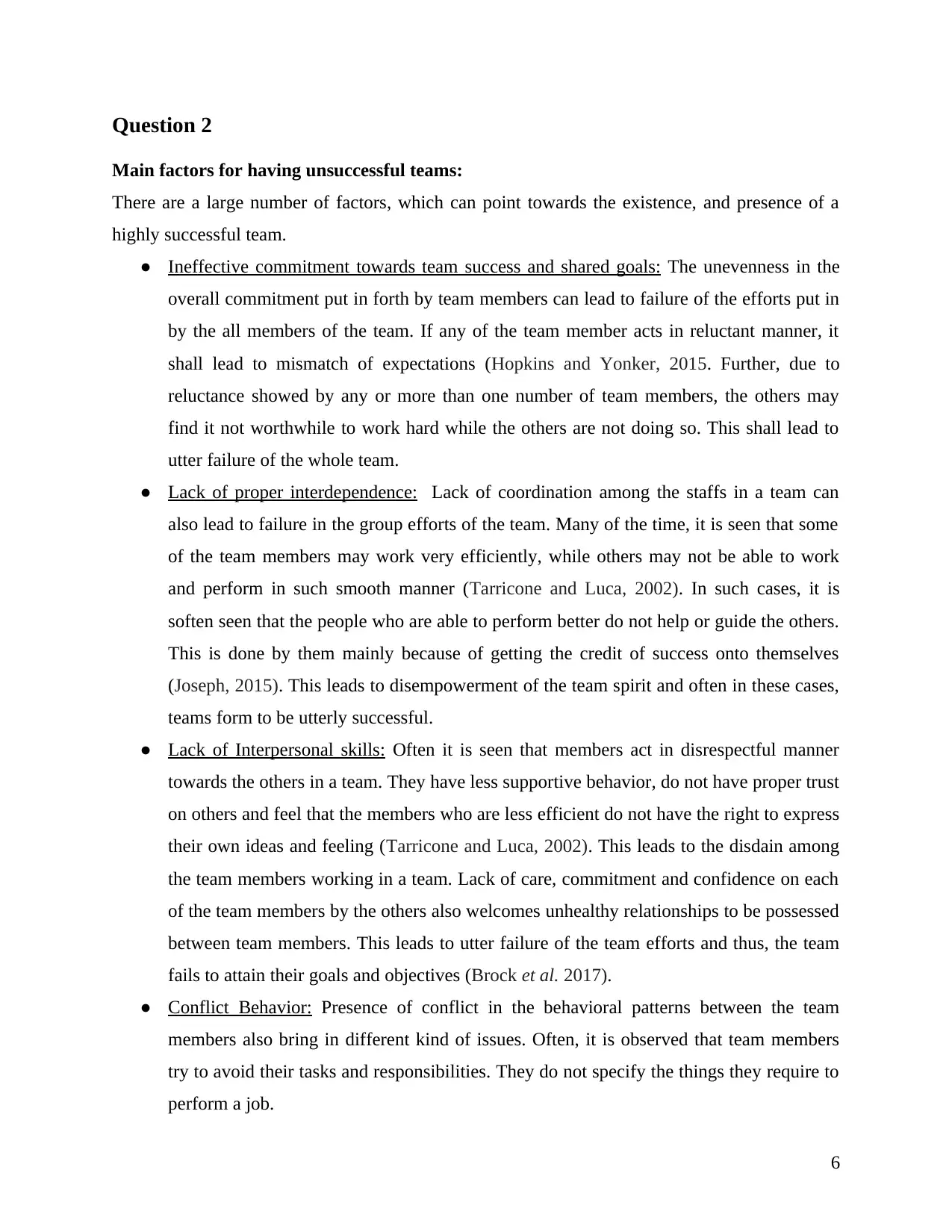
Question 2
Main factors for having unsuccessful teams:
There are a large number of factors, which can point towards the existence, and presence of a
highly successful team.
● Ineffective commitment towards team success and shared goals: The unevenness in the
overall commitment put in forth by team members can lead to failure of the efforts put in
by the all members of the team. If any of the team member acts in reluctant manner, it
shall lead to mismatch of expectations (Hopkins and Yonker, 2015. Further, due to
reluctance showed by any or more than one number of team members, the others may
find it not worthwhile to work hard while the others are not doing so. This shall lead to
utter failure of the whole team.
● Lack of proper interdependence: Lack of coordination among the staffs in a team can
also lead to failure in the group efforts of the team. Many of the time, it is seen that some
of the team members may work very efficiently, while others may not be able to work
and perform in such smooth manner (Tarricone and Luca, 2002). In such cases, it is
soften seen that the people who are able to perform better do not help or guide the others.
This is done by them mainly because of getting the credit of success onto themselves
(Joseph, 2015). This leads to disempowerment of the team spirit and often in these cases,
teams form to be utterly successful.
● Lack of Interpersonal skills: Often it is seen that members act in disrespectful manner
towards the others in a team. They have less supportive behavior, do not have proper trust
on others and feel that the members who are less efficient do not have the right to express
their own ideas and feeling (Tarricone and Luca, 2002). This leads to the disdain among
the team members working in a team. Lack of care, commitment and confidence on each
of the team members by the others also welcomes unhealthy relationships to be possessed
between team members. This leads to utter failure of the team efforts and thus, the team
fails to attain their goals and objectives (Brock et al. 2017).
● Conflict Behavior: Presence of conflict in the behavioral patterns between the team
members also bring in different kind of issues. Often, it is observed that team members
try to avoid their tasks and responsibilities. They do not specify the things they require to
perform a job.
6
Main factors for having unsuccessful teams:
There are a large number of factors, which can point towards the existence, and presence of a
highly successful team.
● Ineffective commitment towards team success and shared goals: The unevenness in the
overall commitment put in forth by team members can lead to failure of the efforts put in
by the all members of the team. If any of the team member acts in reluctant manner, it
shall lead to mismatch of expectations (Hopkins and Yonker, 2015. Further, due to
reluctance showed by any or more than one number of team members, the others may
find it not worthwhile to work hard while the others are not doing so. This shall lead to
utter failure of the whole team.
● Lack of proper interdependence: Lack of coordination among the staffs in a team can
also lead to failure in the group efforts of the team. Many of the time, it is seen that some
of the team members may work very efficiently, while others may not be able to work
and perform in such smooth manner (Tarricone and Luca, 2002). In such cases, it is
soften seen that the people who are able to perform better do not help or guide the others.
This is done by them mainly because of getting the credit of success onto themselves
(Joseph, 2015). This leads to disempowerment of the team spirit and often in these cases,
teams form to be utterly successful.
● Lack of Interpersonal skills: Often it is seen that members act in disrespectful manner
towards the others in a team. They have less supportive behavior, do not have proper trust
on others and feel that the members who are less efficient do not have the right to express
their own ideas and feeling (Tarricone and Luca, 2002). This leads to the disdain among
the team members working in a team. Lack of care, commitment and confidence on each
of the team members by the others also welcomes unhealthy relationships to be possessed
between team members. This leads to utter failure of the team efforts and thus, the team
fails to attain their goals and objectives (Brock et al. 2017).
● Conflict Behavior: Presence of conflict in the behavioral patterns between the team
members also bring in different kind of issues. Often, it is observed that team members
try to avoid their tasks and responsibilities. They do not specify the things they require to
perform a job.
6
⊘ This is a preview!⊘
Do you want full access?
Subscribe today to unlock all pages.

Trusted by 1+ million students worldwide
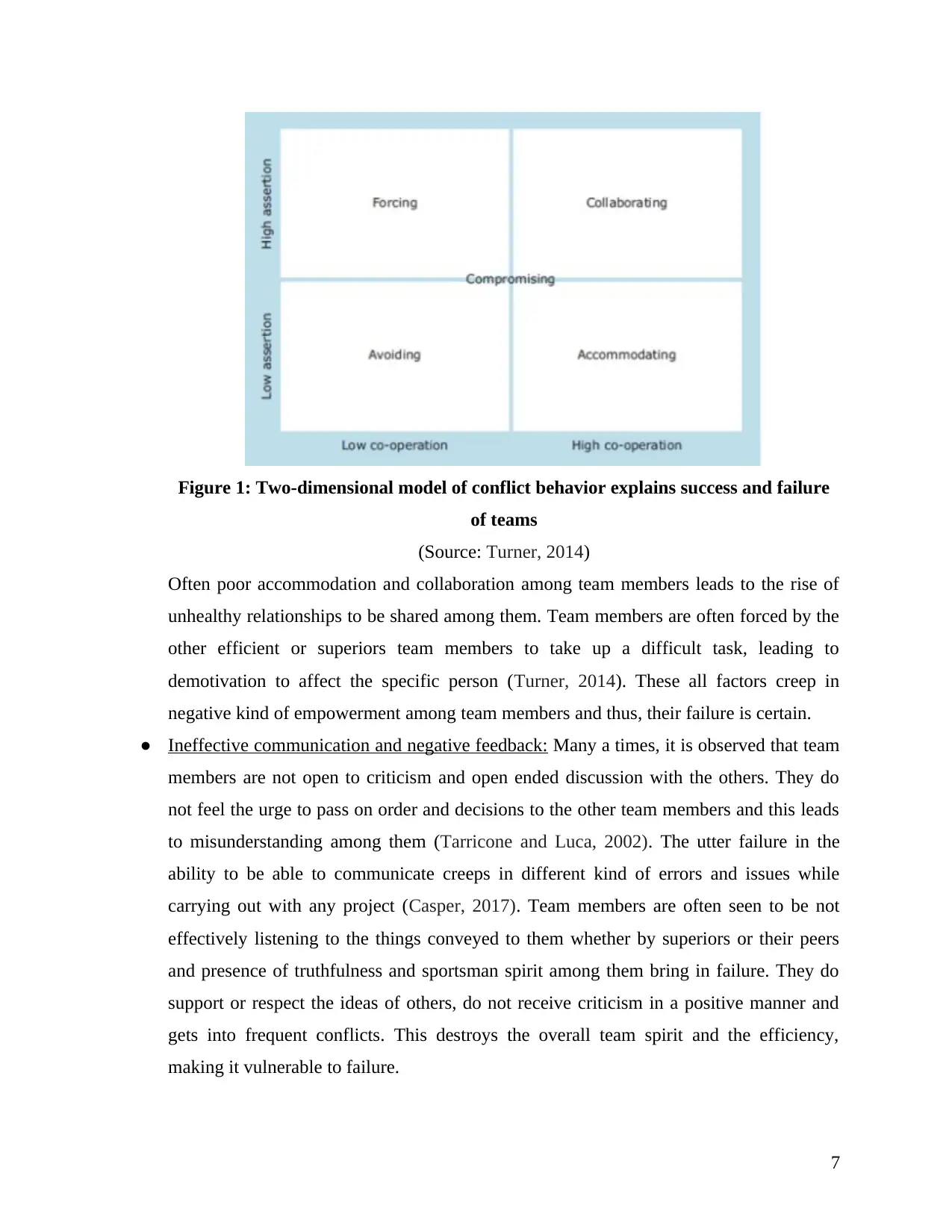
Figure 1: Two-dimensional model of conflict behavior explains success and failure
of teams
(Source: Turner, 2014)
Often poor accommodation and collaboration among team members leads to the rise of
unhealthy relationships to be shared among them. Team members are often forced by the
other efficient or superiors team members to take up a difficult task, leading to
demotivation to affect the specific person (Turner, 2014). These all factors creep in
negative kind of empowerment among team members and thus, their failure is certain.
● Ineffective communication and negative feedback: Many a times, it is observed that team
members are not open to criticism and open ended discussion with the others. They do
not feel the urge to pass on order and decisions to the other team members and this leads
to misunderstanding among them (Tarricone and Luca, 2002). The utter failure in the
ability to be able to communicate creeps in different kind of errors and issues while
carrying out with any project (Casper, 2017). Team members are often seen to be not
effectively listening to the things conveyed to them whether by superiors or their peers
and presence of truthfulness and sportsman spirit among them bring in failure. They do
support or respect the ideas of others, do not receive criticism in a positive manner and
gets into frequent conflicts. This destroys the overall team spirit and the efficiency,
making it vulnerable to failure.
7
of teams
(Source: Turner, 2014)
Often poor accommodation and collaboration among team members leads to the rise of
unhealthy relationships to be shared among them. Team members are often forced by the
other efficient or superiors team members to take up a difficult task, leading to
demotivation to affect the specific person (Turner, 2014). These all factors creep in
negative kind of empowerment among team members and thus, their failure is certain.
● Ineffective communication and negative feedback: Many a times, it is observed that team
members are not open to criticism and open ended discussion with the others. They do
not feel the urge to pass on order and decisions to the other team members and this leads
to misunderstanding among them (Tarricone and Luca, 2002). The utter failure in the
ability to be able to communicate creeps in different kind of errors and issues while
carrying out with any project (Casper, 2017). Team members are often seen to be not
effectively listening to the things conveyed to them whether by superiors or their peers
and presence of truthfulness and sportsman spirit among them bring in failure. They do
support or respect the ideas of others, do not receive criticism in a positive manner and
gets into frequent conflicts. This destroys the overall team spirit and the efficiency,
making it vulnerable to failure.
7
Paraphrase This Document
Need a fresh take? Get an instant paraphrase of this document with our AI Paraphraser
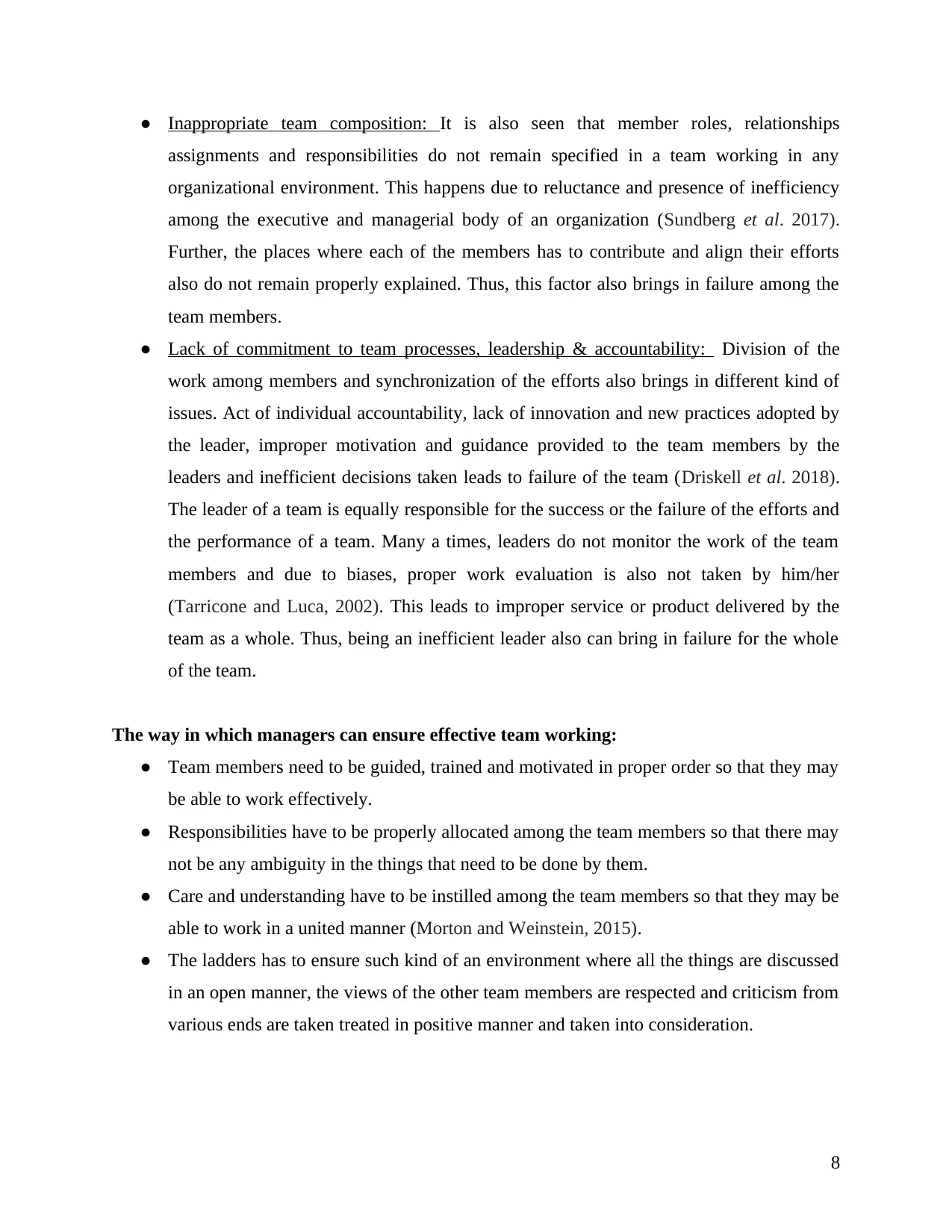
● Inappropriate team composition: It is also seen that member roles, relationships
assignments and responsibilities do not remain specified in a team working in any
organizational environment. This happens due to reluctance and presence of inefficiency
among the executive and managerial body of an organization (Sundberg et al. 2017).
Further, the places where each of the members has to contribute and align their efforts
also do not remain properly explained. Thus, this factor also brings in failure among the
team members.
● Lack of commitment to team processes, leadership & accountability: Division of the
work among members and synchronization of the efforts also brings in different kind of
issues. Act of individual accountability, lack of innovation and new practices adopted by
the leader, improper motivation and guidance provided to the team members by the
leaders and inefficient decisions taken leads to failure of the team (Driskell et al. 2018).
The leader of a team is equally responsible for the success or the failure of the efforts and
the performance of a team. Many a times, leaders do not monitor the work of the team
members and due to biases, proper work evaluation is also not taken by him/her
(Tarricone and Luca, 2002). This leads to improper service or product delivered by the
team as a whole. Thus, being an inefficient leader also can bring in failure for the whole
of the team.
The way in which managers can ensure effective team working:
● Team members need to be guided, trained and motivated in proper order so that they may
be able to work effectively.
● Responsibilities have to be properly allocated among the team members so that there may
not be any ambiguity in the things that need to be done by them.
● Care and understanding have to be instilled among the team members so that they may be
able to work in a united manner (Morton and Weinstein, 2015).
● The ladders has to ensure such kind of an environment where all the things are discussed
in an open manner, the views of the other team members are respected and criticism from
various ends are taken treated in positive manner and taken into consideration.
8
assignments and responsibilities do not remain specified in a team working in any
organizational environment. This happens due to reluctance and presence of inefficiency
among the executive and managerial body of an organization (Sundberg et al. 2017).
Further, the places where each of the members has to contribute and align their efforts
also do not remain properly explained. Thus, this factor also brings in failure among the
team members.
● Lack of commitment to team processes, leadership & accountability: Division of the
work among members and synchronization of the efforts also brings in different kind of
issues. Act of individual accountability, lack of innovation and new practices adopted by
the leader, improper motivation and guidance provided to the team members by the
leaders and inefficient decisions taken leads to failure of the team (Driskell et al. 2018).
The leader of a team is equally responsible for the success or the failure of the efforts and
the performance of a team. Many a times, leaders do not monitor the work of the team
members and due to biases, proper work evaluation is also not taken by him/her
(Tarricone and Luca, 2002). This leads to improper service or product delivered by the
team as a whole. Thus, being an inefficient leader also can bring in failure for the whole
of the team.
The way in which managers can ensure effective team working:
● Team members need to be guided, trained and motivated in proper order so that they may
be able to work effectively.
● Responsibilities have to be properly allocated among the team members so that there may
not be any ambiguity in the things that need to be done by them.
● Care and understanding have to be instilled among the team members so that they may be
able to work in a united manner (Morton and Weinstein, 2015).
● The ladders has to ensure such kind of an environment where all the things are discussed
in an open manner, the views of the other team members are respected and criticism from
various ends are taken treated in positive manner and taken into consideration.
8
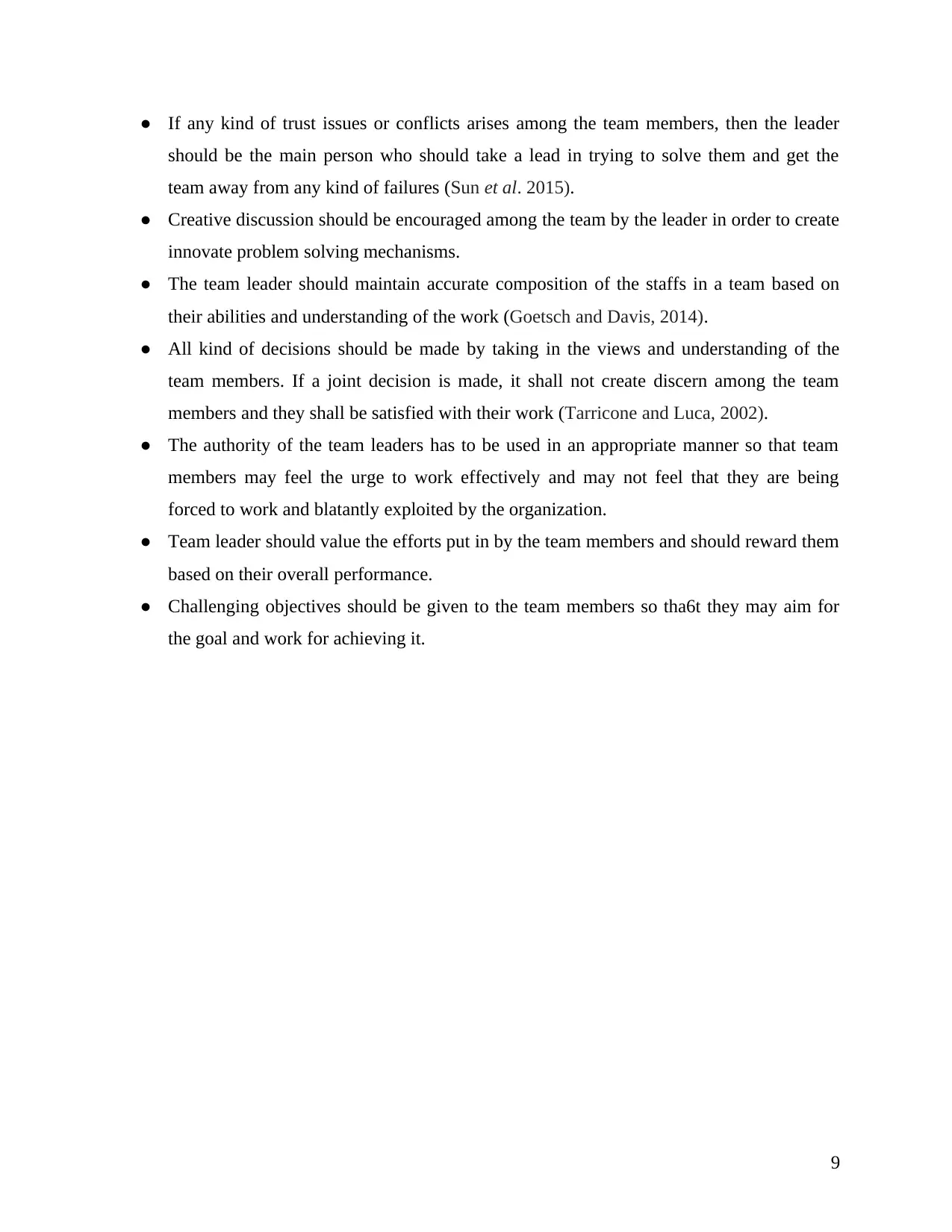
● If any kind of trust issues or conflicts arises among the team members, then the leader
should be the main person who should take a lead in trying to solve them and get the
team away from any kind of failures (Sun et al. 2015).
● Creative discussion should be encouraged among the team by the leader in order to create
innovate problem solving mechanisms.
● The team leader should maintain accurate composition of the staffs in a team based on
their abilities and understanding of the work (Goetsch and Davis, 2014).
● All kind of decisions should be made by taking in the views and understanding of the
team members. If a joint decision is made, it shall not create discern among the team
members and they shall be satisfied with their work (Tarricone and Luca, 2002).
● The authority of the team leaders has to be used in an appropriate manner so that team
members may feel the urge to work effectively and may not feel that they are being
forced to work and blatantly exploited by the organization.
● Team leader should value the efforts put in by the team members and should reward them
based on their overall performance.
● Challenging objectives should be given to the team members so tha6t they may aim for
the goal and work for achieving it.
9
should be the main person who should take a lead in trying to solve them and get the
team away from any kind of failures (Sun et al. 2015).
● Creative discussion should be encouraged among the team by the leader in order to create
innovate problem solving mechanisms.
● The team leader should maintain accurate composition of the staffs in a team based on
their abilities and understanding of the work (Goetsch and Davis, 2014).
● All kind of decisions should be made by taking in the views and understanding of the
team members. If a joint decision is made, it shall not create discern among the team
members and they shall be satisfied with their work (Tarricone and Luca, 2002).
● The authority of the team leaders has to be used in an appropriate manner so that team
members may feel the urge to work effectively and may not feel that they are being
forced to work and blatantly exploited by the organization.
● Team leader should value the efforts put in by the team members and should reward them
based on their overall performance.
● Challenging objectives should be given to the team members so tha6t they may aim for
the goal and work for achieving it.
9
⊘ This is a preview!⊘
Do you want full access?
Subscribe today to unlock all pages.

Trusted by 1+ million students worldwide
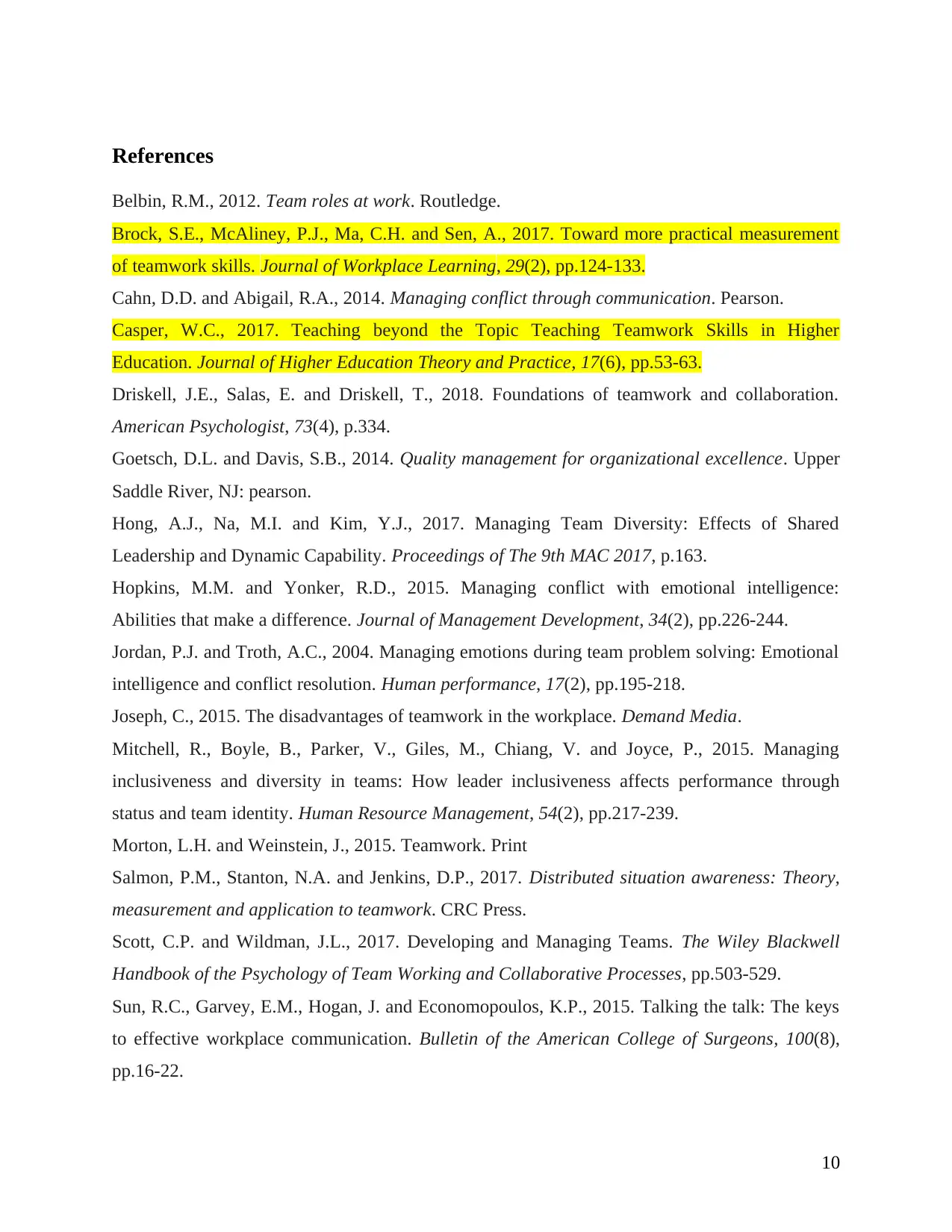
References
Belbin, R.M., 2012. Team roles at work. Routledge.
Brock, S.E., McAliney, P.J., Ma, C.H. and Sen, A., 2017. Toward more practical measurement
of teamwork skills. Journal of Workplace Learning, 29(2), pp.124-133.
Cahn, D.D. and Abigail, R.A., 2014. Managing conflict through communication. Pearson.
Casper, W.C., 2017. Teaching beyond the Topic Teaching Teamwork Skills in Higher
Education. Journal of Higher Education Theory and Practice, 17(6), pp.53-63.
Driskell, J.E., Salas, E. and Driskell, T., 2018. Foundations of teamwork and collaboration.
American Psychologist, 73(4), p.334.
Goetsch, D.L. and Davis, S.B., 2014. Quality management for organizational excellence. Upper
Saddle River, NJ: pearson.
Hong, A.J., Na, M.I. and Kim, Y.J., 2017. Managing Team Diversity: Effects of Shared
Leadership and Dynamic Capability. Proceedings of The 9th MAC 2017, p.163.
Hopkins, M.M. and Yonker, R.D., 2015. Managing conflict with emotional intelligence:
Abilities that make a difference. Journal of Management Development, 34(2), pp.226-244.
Jordan, P.J. and Troth, A.C., 2004. Managing emotions during team problem solving: Emotional
intelligence and conflict resolution. Human performance, 17(2), pp.195-218.
Joseph, C., 2015. The disadvantages of teamwork in the workplace. Demand Media.
Mitchell, R., Boyle, B., Parker, V., Giles, M., Chiang, V. and Joyce, P., 2015. Managing
inclusiveness and diversity in teams: How leader inclusiveness affects performance through
status and team identity. Human Resource Management, 54(2), pp.217-239.
Morton, L.H. and Weinstein, J., 2015. Teamwork. Print
Salmon, P.M., Stanton, N.A. and Jenkins, D.P., 2017. Distributed situation awareness: Theory,
measurement and application to teamwork. CRC Press.
Scott, C.P. and Wildman, J.L., 2017. Developing and Managing Teams. The Wiley Blackwell
Handbook of the Psychology of Team Working and Collaborative Processes, pp.503-529.
Sun, R.C., Garvey, E.M., Hogan, J. and Economopoulos, K.P., 2015. Talking the talk: The keys
to effective workplace communication. Bulletin of the American College of Surgeons, 100(8),
pp.16-22.
10
Belbin, R.M., 2012. Team roles at work. Routledge.
Brock, S.E., McAliney, P.J., Ma, C.H. and Sen, A., 2017. Toward more practical measurement
of teamwork skills. Journal of Workplace Learning, 29(2), pp.124-133.
Cahn, D.D. and Abigail, R.A., 2014. Managing conflict through communication. Pearson.
Casper, W.C., 2017. Teaching beyond the Topic Teaching Teamwork Skills in Higher
Education. Journal of Higher Education Theory and Practice, 17(6), pp.53-63.
Driskell, J.E., Salas, E. and Driskell, T., 2018. Foundations of teamwork and collaboration.
American Psychologist, 73(4), p.334.
Goetsch, D.L. and Davis, S.B., 2014. Quality management for organizational excellence. Upper
Saddle River, NJ: pearson.
Hong, A.J., Na, M.I. and Kim, Y.J., 2017. Managing Team Diversity: Effects of Shared
Leadership and Dynamic Capability. Proceedings of The 9th MAC 2017, p.163.
Hopkins, M.M. and Yonker, R.D., 2015. Managing conflict with emotional intelligence:
Abilities that make a difference. Journal of Management Development, 34(2), pp.226-244.
Jordan, P.J. and Troth, A.C., 2004. Managing emotions during team problem solving: Emotional
intelligence and conflict resolution. Human performance, 17(2), pp.195-218.
Joseph, C., 2015. The disadvantages of teamwork in the workplace. Demand Media.
Mitchell, R., Boyle, B., Parker, V., Giles, M., Chiang, V. and Joyce, P., 2015. Managing
inclusiveness and diversity in teams: How leader inclusiveness affects performance through
status and team identity. Human Resource Management, 54(2), pp.217-239.
Morton, L.H. and Weinstein, J., 2015. Teamwork. Print
Salmon, P.M., Stanton, N.A. and Jenkins, D.P., 2017. Distributed situation awareness: Theory,
measurement and application to teamwork. CRC Press.
Scott, C.P. and Wildman, J.L., 2017. Developing and Managing Teams. The Wiley Blackwell
Handbook of the Psychology of Team Working and Collaborative Processes, pp.503-529.
Sun, R.C., Garvey, E.M., Hogan, J. and Economopoulos, K.P., 2015. Talking the talk: The keys
to effective workplace communication. Bulletin of the American College of Surgeons, 100(8),
pp.16-22.
10
Paraphrase This Document
Need a fresh take? Get an instant paraphrase of this document with our AI Paraphraser
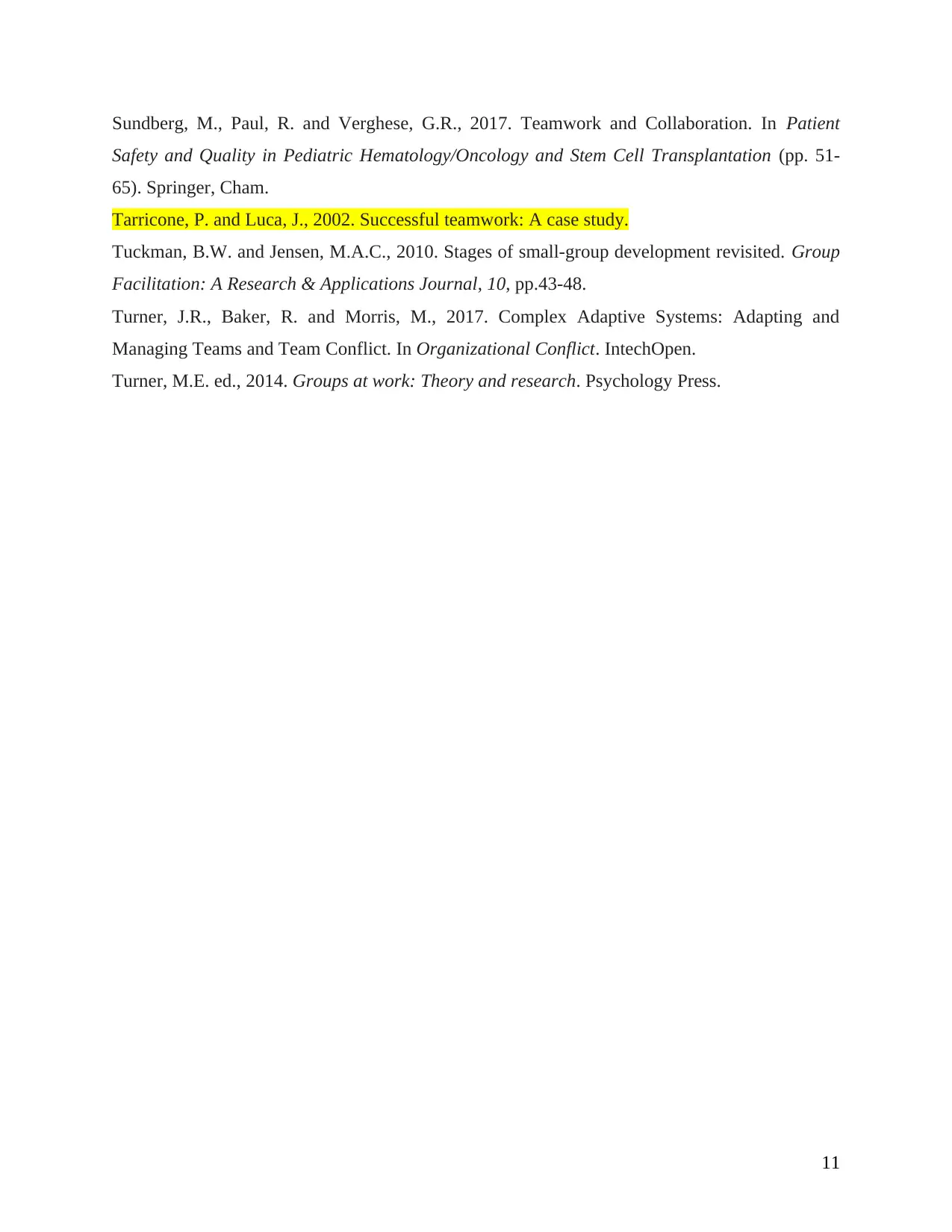
Sundberg, M., Paul, R. and Verghese, G.R., 2017. Teamwork and Collaboration. In Patient
Safety and Quality in Pediatric Hematology/Oncology and Stem Cell Transplantation (pp. 51-
65). Springer, Cham.
Tarricone, P. and Luca, J., 2002. Successful teamwork: A case study.
Tuckman, B.W. and Jensen, M.A.C., 2010. Stages of small-group development revisited. Group
Facilitation: A Research & Applications Journal, 10, pp.43-48.
Turner, J.R., Baker, R. and Morris, M., 2017. Complex Adaptive Systems: Adapting and
Managing Teams and Team Conflict. In Organizational Conflict. IntechOpen.
Turner, M.E. ed., 2014. Groups at work: Theory and research. Psychology Press.
11
Safety and Quality in Pediatric Hematology/Oncology and Stem Cell Transplantation (pp. 51-
65). Springer, Cham.
Tarricone, P. and Luca, J., 2002. Successful teamwork: A case study.
Tuckman, B.W. and Jensen, M.A.C., 2010. Stages of small-group development revisited. Group
Facilitation: A Research & Applications Journal, 10, pp.43-48.
Turner, J.R., Baker, R. and Morris, M., 2017. Complex Adaptive Systems: Adapting and
Managing Teams and Team Conflict. In Organizational Conflict. IntechOpen.
Turner, M.E. ed., 2014. Groups at work: Theory and research. Psychology Press.
11
1 out of 11
Related Documents
Your All-in-One AI-Powered Toolkit for Academic Success.
+13062052269
info@desklib.com
Available 24*7 on WhatsApp / Email
![[object Object]](/_next/static/media/star-bottom.7253800d.svg)
Unlock your academic potential
Copyright © 2020–2025 A2Z Services. All Rights Reserved. Developed and managed by ZUCOL.





